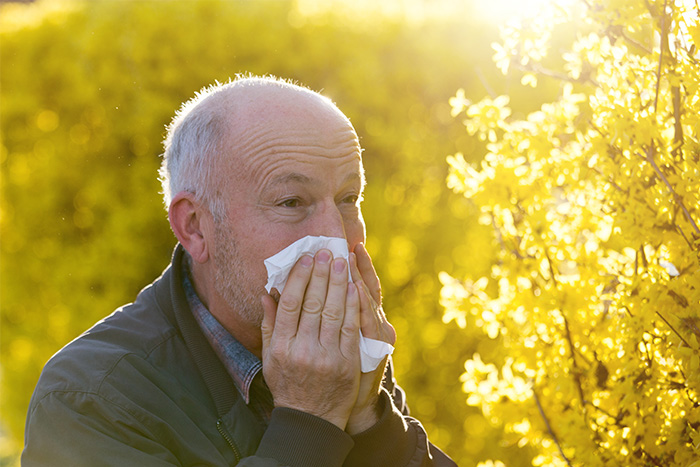Spring can affect your hearing health in different ways, so it’s important to be proactive about protecting your ears and hearing aids from allergens.

Common Spring Allergens
Allergies are the result of your immune system releasing histamine into your bloodstream because it mistakes allergens as a threat. Allergens come from plants that have started to bloom and release pollen.
Sources of spring allergies include:
- Trees, such as oak and birch
- Grass
- Flowers
- Pet dander
- Mold
- Mildew
- Dust
- Insect bites and stings
How Allergies Affect Your Ears
Outer ear: Your outer ear is the most susceptible to allergic skin reactions such as itchiness and swelling. Allergens can settle on your outer ear and get into your ear canal whenever you go outside, especially if you’re gardening or mowing your lawn. You should never put anything into your ear canal to relieve irritation.
Middle ear: Allergens may cause your ear canal to swell and block sound from traveling into your inner ear, resulting in conductive hearing loss. That inflammation also affects your Eustachian tube that connects to your throat and drains excess fluid from your ears, preventing proper drainage. That could lead to ear infections, dizziness and balance issues.
Inner ear: Your inner ear is another environment that is prone to allergic reactions like swelling, fluid retention and infection. Those symptoms negatively affect your inner ear’s ability to convert sound vibrations into electrical signals for your brain.
Allergies and Hearing Aids
Pollen, dust and other allergens can clog the mic ports on your hearing aids and muffle sounds. Because of that, you may be tempted to turn up the volume on your devices but that could harm your hearing. And if your ears are affected by spring allergies, your hearing aids may exacerbate symptoms like itchiness, irritation and swelling.
Spring weather also brings rain and humidity, which can damage your hearing aids. Wear a hat or carry an umbrella during inclement weather to protect your devices. Dry your hearing aids as soon as possible if they’re exposed to moisture and leave the battery compartment door open when you remove your hearing aids to allow trapped moisture to evaporate.
Cleaning your hearing aids daily limits the amount of pollen buildup on your hearing aids and in your ears. Use a soft bristle brush, like a toothbrush, to remove debris from your devices. If you have domes, use a soft, clean cloth to remove earwax. Replace wax guards, mic covers and domes more frequently during spring allergy season.
While it’s important to continue at-home hearing aid cleaning, you should also bring your hearing aids to Audio Help Hearing Centers at the end of spring for a thorough cleaning and adjustment. Our expert audiologists have extensive training and tools to complete precise cleanings and make necessary adjustments if allergies affect your hearing.
Tips for Protecting Your Hearing from Allergies
Schedule an in-person hearing test at Audio Help Hearing Centers to monitor your hearing health. If your hearing loss progresses suddenly, it could be due to allergies. Knowing the state of your hearing health allows you to rule out potential causes and take steps to make improvements.
Wash your hands and face and wipe your devices after you’ve been outdoors to eliminate pollen. You may also need to change your clothes, which hold onto allergens.
Keep your house and car windows closed and use air conditioning. Change the air filter to keep dust to a minimum.
Talk with your primary physician about prescription and over-the-counter medications to manage your allergy symptoms.
Are springtime allergies affecting your hearing? Visit an Audio Help Hearing Centers office in New York City or Scarsdale, New York, or Stamford Connecticut. Give us a call at 888-832-9966 or schedule your appointment online.

